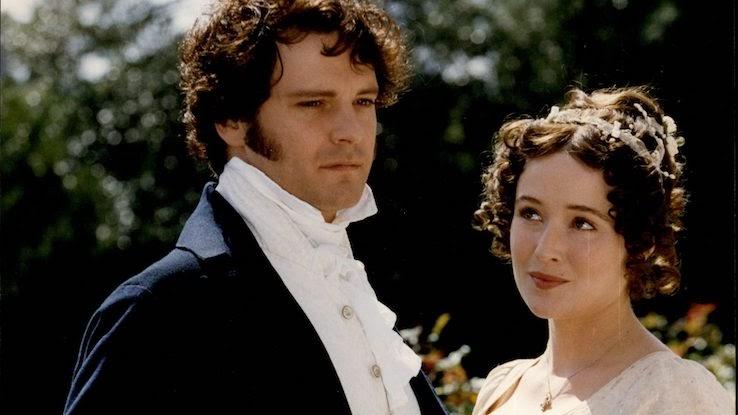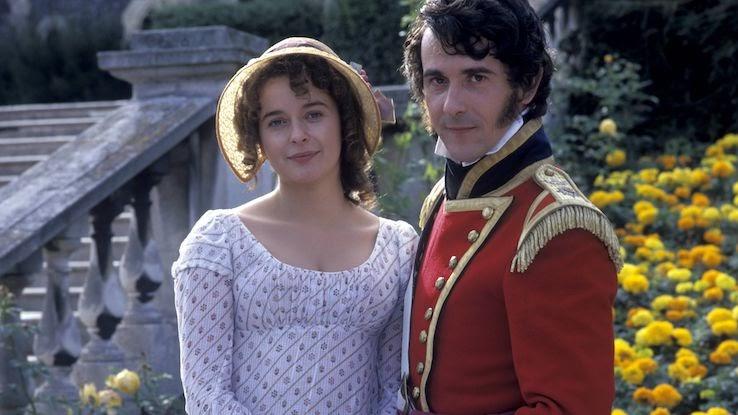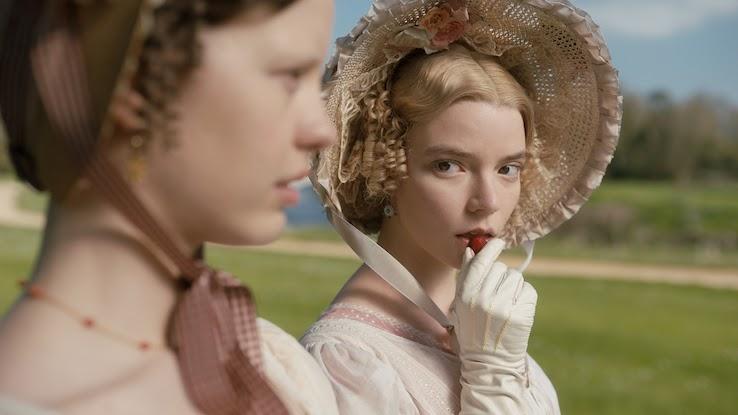Read the Passage From on Making an Agreeable Marriage by Jane Austen

In that location's a passage toward the kickoff of Jane Austen's Pride and Prejudice in which the militia officer George Wickham confides in the volume'due south protagonist — the witty and intelligent however slightly prejudiced Elizabeth Bennet. Wickham tells her that the admirer Mr. Darcy cheated him out of a church position that came with generous pay. "This is quite shocking!—He deserves to be publicly disgraced," Elizabeth quips.
Elizabeth's decided dislike of Darcy is only reinforced by this tale, but she doesn't divulge the data, other than to her elder sis, Jane. She's not a gossip. Wickham doesn't have the same sense of discretion Elizabeth has, however. He tells his story to the whole of Hertfordshire's gild — even though he'd assured Elizabeth he wasn't going to expose Darcy out of respect toward Darcy'southward tardily father. "And every body was pleased to think how much they had ever disliked Mr. Darcy before they had known any thing of the matter," Austen writes nearly the reaction the gentry at Hertfordshire accept upon hearing Wickham's account.
Darcy had been cancelled, at least in early 19th-century terms.
Having a ruined reputation. Becoming the focus of public shaming. Beingness dishonored. Being discredited. Facing backfire for something. The concept of cancel civilisation — the removal of back up toward someone based on their objectionable behavior or opinions — isn't new.
In Pride and Prejudice and through the genre of comedy of manners, Austen further depicts the norms of club and explores the concept of public disgrace. Later on in the novel, nosotros notice out information technology was Wickham who resolved against taking religious orders and preferred to receive monetary compensation from Mr. Darcy instead. Wickham lied about Darcy's handling of him. Through a letter Darcy addresses to Elizabeth, we learn Wickham tried to seduce Darcy'due south immature sis and was planning to elope with her. Wickham was mainly attracted by the fortune Darcy's sister is meant to inherit. "Regard for my sister's credit and feelings prevented any public exposure," Darcy says nearly his motives non to reveal the truthful nature of Wickham'south character and his lack of accolade.
The Different Consequences of Disreputable Behaviour Depending on Gender in Austen's Literature
After reading Darcy's letter of the alphabet, Elizabeth seeks her sister Jane's counsel one time again. "I want to be told whether I ought, or ought not to make our acquaintance in full general empathize Wickham's character," Elizabeth tells Jane. The sisters agree not to exercise information technology. Such exposure of Wickham's character would be "dreadful"; plus, Darcy hasn't authorized Elizabeth to make his communication public.

But when Elizabeth and Jane'due south younger sister, Lydia, falls prey to Wickham's charms — they run away together — the human activity could have irrevocable consequences not only for Lydia merely also for all of the Bennet sisters. Lydia is accounted too poor for the ambitious Wickham to really intend to marry her. At the time, marriage would be the only style to salve the honor of a girl who's been unchaperoned and with a man for days. "The death of your daughter would have been a blessing in comparison of this," Mr. Collins says about the matter in a letter addressed to Elizabeth'southward male parent, Mr. Bennet. Collins is an affected chaplain of dubious character and Mr. Bennet's distant cousin and heir. "This fake pace in one daughter will be injurious to the fortunes of all the others, for who […] will connect themselves with such a family."
Deeply shaken by the whole matter, Jane and Elizabeth wonder what would take happened if they had exposed Wickham's true graphic symbol. Would Lydia take been condom from him then?
In the end, Wickham is revealed to be imprudent, extravagant and prone to leave his debts unpaid. Darcy forces Wickham to marry Lydia — she'southward happy with the arrangement — and the expert name of the Bennets is restored. Darcy'south name is also redeemed in Hertfordshire when Elizabeth accepts marrying him. His incredible wealth — and the fact that he acquires an agreement of how to be less disdainful — may accept also played a role in uncancelling his persona.
The concept of reputation has inverse with time. For many women, it no longer means going from the guardianship of a parent to that of a hubby or blood brother without a hint of reproach in between. Simply even during Austen's time, honor and reputation weren't but a matter of gender, but too status.

Take Austen's 1815 novel Emma nigh a spoiled, rich, immature and beautiful heiress who lives in the minor hamlet of Highbury. The lack of society influences Emma to look for her next best friend amid the boarders at a local school, and she befriends Harriet, an illegitimate daughter whose father's identity is unknown. Emma decides to believe Harriet must exist the daughter of a gentleman, but the human relationship between the two of them is never on equal terms.
"It would accept grieved me to lose your acquaintance, which must take been the issue of marrying Mr. Martin," Emma tells Harriet after coercing her not to accept the marriage proposal from the farmer Mr. Martin. "It would have meant the loss of a friend to me. I could not have visited Mrs. Robert Martin, of Abbey-Mill Farm. Now I am secure of you forever."
Had Harriet decided to marry a farmer, the snobbish Emma would have been forced to cancel her friend. No more hobnobbing with the Highbury society for Harriet. No more being invited to dinner parties, dances or tea.
The fact that Emma is both rich and at the very top of Highbury club allows her to make that kind of decision, whereas Harriet has to brand exercise with the fact that Emma allows her the privilege of her attachment.
At that place's another character in Emma who takes advantage of his higher position in the social ladder: Frank Churchill. He's the son of Mr. Weston by his first marriage and he was adopted by Mr. Weston'due south brother-in-constabulary, Mr. Churchill, and his wife. The Churchills are very wealthy, and Frank is their only heir. Throughout several instances of ridicule and deception, Frank acts abominably to everyone. He misleads Mr. Weston and his new wife, Emma's former governess, regarding the field of study of his affections. He flirts with Emma even though he is not interested in her. He ignores and vexes his actual fiancée, Jane Fairfax. And he mocks Jane'due south aunt, the impoverished Miss Bates.
Jane and Frank keep their engagement secret because Frank's aunt wouldn't corroborate of it. Jane'due south lack of coin or position — even though she's extremely educated, refined and talented — makes her an unsuitable candidate for becoming Mrs. Frank Churchill.
With Mrs. Churchill's sudden expiry and Jane on the brink of condign a governess, Frank makes public his true feelings. Mr. Churchill gives his consent to the match, interim in opposition to what his belatedly wife would have required. Frank no longer risks existence left out of the will for marrying Jane. And even though the disclosure of the secret engagement too makes public his dubious behavior toward everyone, he doesn't face much backlash for it. Coin, breeding and guild help.
The rules take changed since Austen'south days. Whereas 1 of her characters may have faced intense criticism in a village or peradventure even an English canton, in today's world social media may dilate the news nearly someone'southward failed reputation in a matter of hours. On the other mitt, the playing field is much more democratized in the present, and, in many cases, public figures are being judged for their actions regardless of their connections, backgrounds or wealth.
Notwithstanding then-chosen cancel culture remains a controversial and complicated subject, whether that's when it's associated with mob mentality or when the real impact on those cancelled is examined.
Nosotros tin acquire from Austen one time once more when approaching it. Her heroines show us how non to jump also fast to conclusions, to question the source of all gossip and to brand our own judgments. But they too prove the value of existence honorable.
Source: https://www.ask.com/culture/jane-austen-cancel-culture-reputation?utm_content=params%3Ao%3D740004%26ad%3DdirN%26qo%3DserpIndex
0 Response to "Read the Passage From on Making an Agreeable Marriage by Jane Austen"
Post a Comment